Components of Modular Kitchen
Components of Modular Kitchen
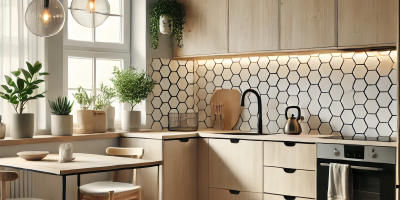
Drawers: Designed for easy access to utensils and smaller kitchen items. They can be customized with dividers for better organization.
- Cutlery Drawers: Specially designed shallow drawers with dividers to store forks, knives, and other utensils.
- Deep Drawers: Ideal for heavy pots, pans, and larger kitchen tools. These often come with organizers to keep the items neatly arranged.
- Soft-Close Mechanism: Modern drawers are fitted with soft-close hinges that ensure they close gently without slamming.
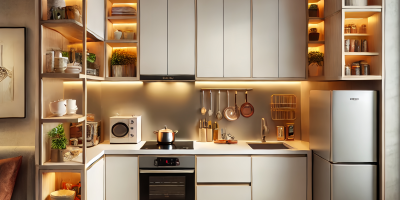
Cabinets: The foundation of any modular kitchen, cabinets come in two main types:
- Wall-mounted cabinets: These are fixed above the countertop, offering storage for lighter items like spices and crockery.
- Base cabinets: Placed below the countertop, they store heavier items like pots, pans and large containers.

Chimney or Exhaust Hood: Essential for ventilation, they help keep the kitchen free from smoke, fumes, and odors.
- Wall-Mounted Chimney: Installed above the stove or cooking range, it helps ventilate smoke, heat, and cooking odors. Modern chimneys come with filters and powerful suction capacities.
- Island Chimney: Installed above a cooking island, this chimney design is perfect for open kitchens.
- Auto-Clean Function: Some chimneys come with a self-cleaning feature that reduces maintenance.

- Sink Types:
- Single Bowl: Ideal for compact kitchens where space is limited.
- Double Bowl: Offers two separate compartments for washing and rinsing simultaneously.
- Undermount: Sinks that are mounted under the countertop for a sleek, seamless look.
- Materials: Stainless steel is the most common material for kitchen sinks due to its durability and ease of cleaning. Other materials include granite composite and ceramic.
- Faucets:
- Available in different designs like pull-out, pull-down, or standard faucets. Many modern kitchens opt for touchless faucets for added convenience.
- Materials: Faucets are usually made from stainless steel or chrome-plated brass to resist rust and corrosion.
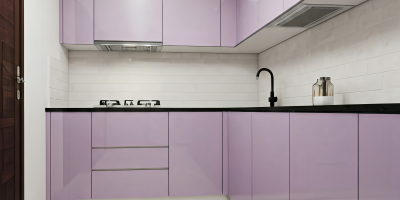
Built-in Appliances: Modular kitchens often include built-in stoves, ovens, microwaves and dishwashers to save space and maintain a sleek look.
- Hob (Cooktop): Built-in gas or electric hobs are seamlessly integrated into the countertop for a clean look. They come with features like auto-ignition, flame failure safety, and multiple burners.
- Oven: Ovens can be built into a tall cabinet or under the countertop. Many modular kitchens include combination units that integrate a microwave and conventional oven.
- Dishwasher: Built-in dishwashers are concealed behind a cabinet door for a streamlined appearance. These save space and improve the kitchen’s functionality.
- Refrigerator: Some modular kitchens integrate the refrigerator into the cabinetry for a cohesive look.
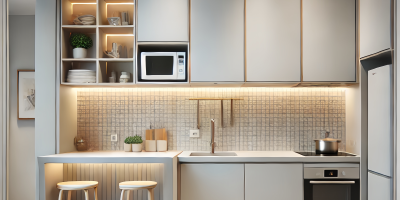
Countertops: Made from materials like granite, marble, quartz or laminate, countertops are durable surfaces for cooking and meal preparation.
- Granite: Known for its durability and heat resistance, granite is a common choice for modular kitchen countertops.
- Quartz: An engineered stone that is non-porous, making it resistant to stains and scratches.
- Marble: Marble offers a luxurious look but is less durable compared to granite or quartz.
- Laminate: Budget-friendly, easy to maintain, and available in various colors and patterns.
- Solid Surface (Corian): Made from acrylic, this material is seamless, repairable and can mimic the appearance of stone.

Backsplash
- Tiles: Ceramic or porcelain tiles are the most common backsplash materials, offering a wide variety of colors and designs. They are easy to clean and resistant to heat and moisture.
- Glass: Glass backsplashes offer a sleek, modern look and are easy to wipe clean.
- Stone: Granite or marble backsplashes are often used to create a seamless design with the countertop.
- Stainless Steel: Provides an industrial look and is easy to maintain in high-traffic kitchens.
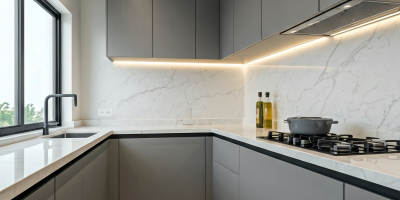
Storage Solution
- Pull-Out Shelves and Baskets: Often installed inside cabinets for easier access to stored items. These work well for storing spices, oils, and condiments.
- Magic Corners: Specialized corner units with rotating or pull-out shelves, making it easier to store and access items in otherwise hard-to-reach areas.
- Tall Pull-Out Units: These work like drawers but are installed vertically. They’re perfect for narrow spaces and provide ample storage for groceries or kitchen tools.
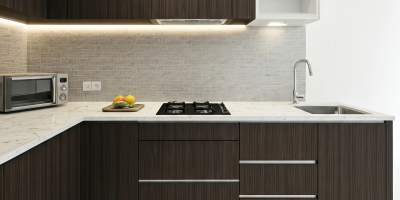
Modular Accessories
- Cutlery Trays: Custom-fitted trays for organizing cutlery and small kitchen tools in drawers.
- Dish Drainers: Installed inside a wall cabinet to allow wet dishes to drip dry, often placed above the sink.
- Pull-Down Units: Installed inside upper cabinets, these units can be pulled down to bring items within easy reach.
- Bottle Pull-Outs: Slim units designed specifically to store bottles of oils, vinegar, and other liquids, typically installed next to the cooking range.
Types of Modular Kitchens
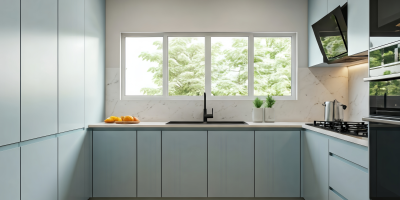
Straight Modular Kitchen
- Layout: A single straight wall.
- Features: Compact and ideal for small spaces. All cooking, washing, and storage areas are aligned in a single line.
- Best For: Studio apartments, small homes, or spaces with limited kitchen width.
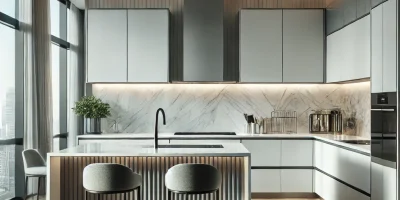
L-Shaped Modular Kitchen
- Layout: Two adjoining walls forming an ‘L’ shape.
- Features: Offers efficient workspace, with distinct cooking and preparation areas. Utilizes corner spaces effectively and provides ample storage.
- Best For: Medium-sized kitchens, open layouts.

U-Shaped Modular Kitchen
- Layout: Three walls forming a ‘U’ shape.
- Features: Maximum storage and workspace with a compact work triangle. Ideal for multiple cooks working simultaneously.
- Best For: Large kitchens or dedicated kitchen rooms.

Parallel (Galley) Modular Kitchen
- Layout: Similar to an island kitchen but the countertop is attached to the main kitchen area, creating an additional working counter.
- Features: Serves as a dining counter or additional workspace without requiring extra floor area.
- Best For: Medium-sized kitchens where space for an island is limited.
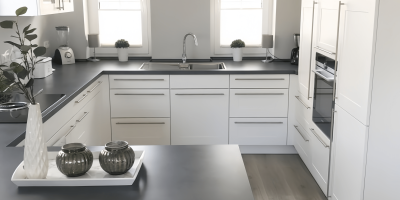
G-Shaped Modular Kitchen
- Layout: Similar to the U-shaped layout but with an additional counter or peninsula extending out.
- Features: Offers more storage and workspace while maintaining compactness.
- Best For: Large families or kitchens with open layouts.

Open Modular Kitchen
- Layout: Integrated with the living or dining area.
- Features: Promotes interaction and seamless transition between spaces. Typically paired with an island or L-shape.
- Best For: Modern homes with open-concept layouts.
Popular Trends in Modular Kitchens

Minimalist Designs:
- Trend: Clean lines, uncluttered spaces, and a focus on functionality.
- Why Popular: Provides a sleek and modern aesthetic. High-gloss or matte finishes in neutral colors like white, grey, or beige are common.
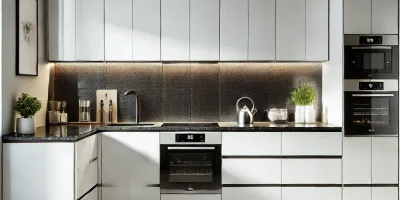
Smart Storage Solutions:
- Trend: Custom pull-out drawers, corner units, and vertical storage.
- Why Popular: Maximizes space utilization and keeps the kitchen organized, even in compact areas.

Sustainable Materials
- Trend: Use of eco-friendly materials like bamboo, recycled wood, and energy-efficient appliances.
- Why Popular: Aligns with the growing focus on sustainability and environmentally conscious living.

Under-Cabinet and Ambient Lighting:
- Trend: LED strip lights beneath cabinets and warm ambient lighting.
- Why Popular: Enhances functionality and creates a cozy ambiance.

Handless Cabinets: Push-to-open or groove-style cabinet doors without handles.
Why Popular: Offers a sleek and modern look while maintaining simplicity.
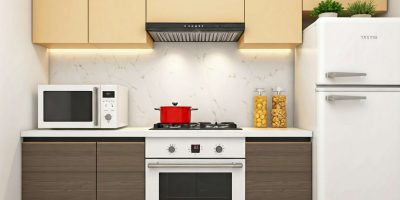
Integrated Appliances:
- Trend: Built-in ovens, refrigerators, and dishwashers integrated into the cabinetry.
- Why Popular: Offers a streamlined and cohesive appearance.

